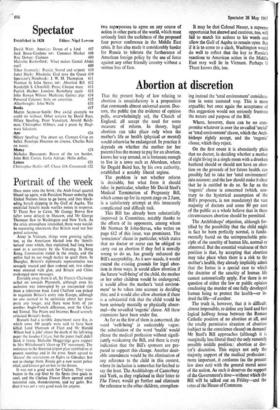U Thant's war
If, once again, war breaks out in the Middle East, between Israel and one or more of the Arab states that surround her, historians may well come to lOok back on it as U Thant's war. For nothing has made a greater contribution towards the present acutely dangerous situation than the preci- pitate, high-handed and grossly irresponsible action of the Secretary-General of the United Nations in unilaterally pulling the entire UN peacekeePing force out of Egypt.
It is worth recalling the sequence of events. On Wednesday General Mortaga, com- manding the Egyptian land forces, asked General Rikhye, in command of the United Nations Emergency Force, to withdraw all his troops from the 117-mile Israeli- Egyptian frontier, and send them to the rela- tive safety of Gaza, to avoid their getting hurt in any open Israeli-Egyptian clash across the frontier. Instead of referring this potentially dangerous situation either to the UN Security Council or to the General Assembly before deciding on any action, the Secretary-General merely pointed out to the Egyptians that their request should be addressed to him personally and not to the general in command. Emboldened by this Unexpectedly supine response, the Egyptians, on Thursday, not only repeated the request direct to U Thant, but significantly expanded it; demanding that the UN troops should be moved not to Gaza but out of Egypt alto- gether, and that the expulsion should apply not only to the UNEF units on the border but also to the vital UN detachment at Sharm- el-sheikh, at the head of the Gulf of Aqaba, some 120 miles away from the supposedly dangerous Israeli-Egyptian frontier. the original request, without any reason what- soever being given, the Secretary-General dutifully complied with the new Egyptian demand and so took the Middle East to the brink of war.
U Thant's interpretation of the status of United Nations forces—that they must leave, wherever they are, whenever the host country asks them to (presumably after ten minutes just as much as after ten years), whatever the circumstances—makes, as Mr George Brown rightly pointed out, a complete mockery of the United Nations' so-called peacekeeping role. But at least acceptance of Egypt's original request, only after full discussion in the United Nations Security Council and General Assembly, would have provided time for diplomacy to .get to work before any irrevocable steps towards war had been taken and would have allowed the possi- bility of a solution involving the shifting of the UN troops to the Israeli side of the border.
But the extraordinary decision of U Thant to withdraw all UN forces from Sharm-el- sheikh as well has altered the situation completely. He has created a state of affairs that can no longer be remedied by the simple expedient of the UN border forces being stationed on the Israeli side : in which Presi-' dent Nasser (doubtless to his own astonish- ment) has been obliged to recapture Sharm- el-sheikh and with it the power to deny Israel her vital access to the Red Sea—a power which he cannot fail to use without grave loss of face in the Arab world; and in which Israel has been presented with a genuine casus Belli that would otherwise not have existed.
” If U Thant had set out deliberately to demonstrate that tlYtUnited4lations was not merely a nonsense, but a dangerous non- sense, he could scarcely have done better. As it is, the hopes of avoiding war now lie, as perhaps they always have done, with Russia and America. But to enforce a Pax Russo-Americana in the Middle East at the present time will not be easy.
The only way in which Israel can be pre- vented from going to war is, as America has already recognised, by ensuring that the Gull of Aqaba remains, throughout its length, an international waterway—a status to which the United States, Britain and France have in any case long been committed. Yet this may well require more than simply the passage of American, British and French vessels up and down the gulf, as a challenge to Nasser that the Egyptian President will not dare take up. He may feel forced to take it up; in which case the use of force by America against the Sharm-el-sheikh emplacement becomeS more than a mere threat.
It is easy to indulge in ironic speculation at the prospect of the Americans, eleven years after their condemnation of the Anglo-French action at Suez, embarking on a new military adventure against President Nasser, in order to keep another Middle East international waterway open. Indeed, it requires'. little imagination to envisage the successor to the ill-fated Suez Canal Users' Association, sctu : sTuA—the Straits of Tiran Users' Association. two superpowers to agree on any course of action in other parts of the world, which must seriously limit the usefulness of the proposed four power conference in the Middle East crisis. It has also made it considerably harder for Russia to tolerate the furtherance of American foreign policy by the use of force against any other friendly country without a serious loss of face. It may be that Colonel Nasser, a supreme opportunist but shrewd and cautious, too, will fag to match his actions to his words and allow the Gulf of Aqaba to remain open. But if it is to come to a clash, Washington would do well to reflect that the key to Russia's reactions to American action in the Middle East may well lie in Vietnam. Perhaps U Thant knows this, too.



































 Previous page
Previous page